
A shark may not be able to generate suction, but "Shark" can very well do so !
The title "is an allegory and a leitmotif - be it the original title "Shark" oder the sometimes internationally also used title "Don´t Look Back: The Legend of Orpheus".The latter not only alludes to the ancient legend of Orpheus, but also to Marc Chagall's painting of the same name, which can be found in the KDrama as a leitmotif, too. It basically describes what this is about. As far as the mythology is concerned: Ultimately, Orpheus never gets his great love Eurydice back - even as tries to return with her from the realm of the dead, he unfortunately doesn't manage to do without "looking back" (the condition for the rescue to be successful). In relation to the story of the KDrama, this could mean: the protagonist would have to give up his revenge - his being stuck in the past. And that brings us to the core of the story: revenge.
The original title "Shark" refers to a second leitmotif: Since childhood the protagonist feels a great affinity and sympathy for this particular predatory fish. Ocean sharks must always be on the move. Their mouth remains open so that fresh, oxygen-rich water can reach their gills and they are able to ´breathe´. Not moving means no fresh oxygen supply and thus their certain death. This implies an inevitable activity at all times - consequently they are always dangerous. Ocean sharks are loners, too. At most they join together in groups for hunting. In this respect, the story is set in the world of powerful, highly influential Jaebeol, whose machinations tremendously drive the Wheel of Fortune. They never stop shaping the world at their will, regardless of the cost. The protagonist courageously competes against one of the really big ones (actually against two). There is plenty of manipulation on all sides - as if you were pulling the strings of puppets. Sometimes one might think of vodoo dolls... Police and lawyers are breathlessly chasing behind the events. (It came at a time when bribery and corruption in South Korean business and politics was still more common and taken for granted than nowaydays. It was only a couple of years later that even the head of state was accused of being part of a shocking network controlled by Jaebeol bribery. To that extent the KDrama was just on spot at its time.)
"Shark" offers a fine study about injustice trying to be compensated by vigilantism. However, making amends is not possible. The protagonist's father is and remains dead. Revenge isn't that easy either, because in the course of his chess moves the protagonist stumbles over truths he didn't expect and a love that could get in the way of revenge plans. (Somehow Orpheus is whispering into the protagonist´s ear: "Do not ´look back´!", e.g. let go of revenge and vigilantism...)
The shark (as an animal) may himself not be able to create suction (for breathing), but the KDrama "Shark" can do so very well. The soundtrack sets the rhythm, the melody burns in, the events take their course and you always want to look around the next bend to see what might happen next. Although the good guy is the bad guy, you're feverishly at his side. And on the side of the bad guys, there are the good guys too. What to do with morals...
"Shark" gives practical insight into the early hours of the Jaebeol and their machinations over time. The roles of their long-term companions, who knew them from the earliest hour before their rise as Jaebeol, are also highlighted (e.g. their companions, today assistants, secretaries, drivers, lawyers, etc.). With those they have come a long way and so the know each other, like no other).
"Shark" is more on a tranquil side and maybe less colourful than other KDramas. Both background and heart of this KDrama with its characteristic tinting are set by the tender childhood love - between the Jaebeol´s grand daughter and the driver´s son... The differentiated side plots also keep viewers on their toes. ... It remains thrilling until the end, when open questions are answered.
Mercilessly the wheel of fortune turns, over 20 episodes. The premonitions of the first scenes are set ´today´. Then, in retrospect, the emotional relationship between the protagonists, what happened back then and where they are coming from is portrayed via their youth experiences, before the today´s storyline is picked up again.
Some call this KDrama a masterpiece. I am one of them.
Yet the whole is as often more than its parts. If you are primarily in it for the romance you might be disappointed in the end. Rather against the setting of this love story the KDrama is giving insights into the careers and backdrop of the shiny Jaebeols´ shady practices. In return on this solid drama-soil the emotionally challenging processes of those two ´associated in love´ unfold...
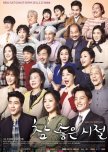
If you´re only in it for the romance, than skip that one. This KDrama is actually so much more.
This is a family saga in cross-section. Typically, the list of the main actors only contains Lee Seo-jin, Kim Hee-sun and Ok Taecyeon. However, I think the whole family belongs here because family is the issue. Of course there is a romance (and not just one). However, sooner or later is always about family. And so "Wonderful Days" is the perfect KDrama to study family structures, dynamics and values as well as its impact on every day life in South Korean culture and tradition.Family hierarchies, manners, customs and traditions are presented in detail. The setting for this is fittingly the traditional hanok, in this case a giwajib, a dwelling for a middle-class family. In "Wonderful Days" you experience family as it would like to be and family as it really is, behind the facade - with all its taboos and lies and secrets and flaws. The issues of disability, adultery and flaws of single parents are dealt with. The questions of who is allowed to marry whom and what that means for family life are worked through. Finally, it is also about pride, guilt, shame, reconciliation, forgiveness and emancipation.
I think actress Youn Yuh-jung rocks the entire show. The processes she goes through again and again are numerous and moving. In some places, where she seems very traditional and her decisions seem virtuous in the service of the family, she also turns out to be truly modern. She always makes up for her lack of education with a lot of heart and common sense. She is already a strong mother model. But at the same time she shows herself vulnerable and conveys very vividly that this mother role demanded by society is practically superhumanly difficult and actually impossible to achieve.
With the action location of Gyeongju, you also get a tiny glimpse of the historic Silla city in south-east South Korea. The grave-mounds of the Silla Kings provide a scenic background more than once. The specific, comparatively melodic Busan dialect that is spoken in this region is also acoustically striking in the dialogues.
This family drama, in which everyone works through their own inner and outer struggles within themselves and the family, is told in a compassionate, vivid and multi-layered manner along numerous storylines through the entire family. Accordingly, this 50-episode KDrama has more episodes than usual. You can indeed learn to understand how the individual in South Korea holds back for the family, or what strength one has to muster in order to protect one's self-interest against the (supposed) well-being of the family, especially the elderly. Self-sacrifice and the ability to suffer are a given - as if it were the most natural thing in the world. However, they are sometimes subtly and sometimes openly questioned. The quarrel is conducted within the drama-family, but inevitably continues in OUR heads, hearts and personal worlds, too. Thus, it is a sensitive socio-critcal study and a sophisticated scenario, for confronting South Korean audience with traditional values facing modern life in 2014. Perhaps it is also interesting to know for non-Koreans (in order to understand some other dynamic of the story): adultery has only been unpunished in South Korea since 2015, abortion since 2017. Before that, it was a crime.
Sometimes the family dynamics are almost unbearable from a western point of view. They may also seem exaggerated as far as our (I am here refering to ´my´ western, german) reality is concerned. The decisions of the protagonists sometimes seem to be incomprehensible. But then again - as far as South Korea is concerned - this is not exaggerated at all. These dynamics are real (but in good makjang fashion, they also add a bit more drama for good catharsis effect). In any case, for Western viewers those dynamics are instructive for studying the culture-specific value systems and, last but not least: occasionally also thought-provoking, too.
Ah. Don´t let me forget to mention... it is about a love story, too. Not only one actually. But if you´re in it for only this romance, than skip that one. You will be busy fast-forwarding most of the time - because this KDrama is actually so much more...
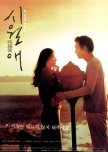
"Il Mare" gently sprays its quiet magic as if through an atomizer.
"Il Mare" is the ´international´ title of this KMovie. However, the original title (rather being translated as "Across Time") does not refer to the place - a picturesque house by the sea - but to what actually happens there: a time-transcending correspondence. Strictly speaking, the letters are sent back and forth in a mailbox over the distance of 2 years. What an unprecendeted plot for a love story to be told in a truly unique way! This story became famous in America and Europe in the 2006 US film adaptation starring Keanu Reeves and Sandra Bullock.Actually you shouldn't compare the two movies side by side, but most people do, so...
The South Korean original was made in 2000 and starred Lee Jung-jae, who was in high demand in South Korea at the time, and Jun Ji-hyun, who was just beginning her career. (Actually you can sense the difference in her acting back then and in her more recent productions. In the meantime she definitely has matured from a ´mere´ beauty into a spirited actress.) While the original shares the same plot as does the US remake later on, the South Korean version places more emphasis on the mood of the protagonists, stressed by using imagery, color and atmosphere. Accordingly, the South Korean original is characterized by less color saturation and less light than the US remake, as both protagonists - Eun-ju and Sung-hyun - are rather disappointed in life, taciturn, withdrawn. The loneliness and emptiness in the protagonists´ lifes is one aspect. The remote house by the sea something completely different. It might perfectly fit into the protagonists´ mood, but in addition it actually has quite some magic to offer: Besides framing and emphasizing the beauty of nature there is the dog as a harbinger of relationship and the mailbox as a bridge between hearts. Thus the overall sensitively told story slowly but surely fills with joy, smiles, laughter and increasingly radiating light.
The KMovie "Il Mare" gently sprays its quiet magic as if through an atomizer.
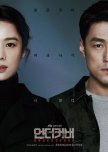
It is about the basic conflict between political ideals & dirty practice. Emotional complex.
Black meets white and every shade in between.Devious meets sincere.
Truth comes into conflict with truthfulness.
Justice wrestles with just behavior.
Even though the KDrama “Undercover” was produced as a remake of a British series, it still tells a very specifically South Korean story. In recent decades, the South Korean intelligence service has changed its name several times in the wake of turbulent political changes. Heads were exchanged here and there, but ultimately numerous agents and executives carried out their jobs both during the last years of the dictatorship, the first years of the increasingly democratic liberal government of the Sixth Republic and up to the present day. This means that those who had to be bitterly persecuted as enemies of the state at some point, became, at a different time, those who potentially needed to be protected at all cost… “Undercover” is set in that context.
Embedded in this is the emotional dynamic of a former undercover agent and his wife. She is now a committed human rights lawyer and the designated director of the newly established political office for corruption investigation. In principle, her agenda is to uncover those machinations in which her husband's employer was involved or even in charge at the time and to this day...
The dramatic dynamite is hidden underneath the fact that the husband missed the right timing of confessing to his wife what he actually had done before and who he was... for good reason. This secret apparently didn't stop the couple from leading a very happy family life to date. But fatally, his past comes knocking at his door, confronting him with an almost insoluble conflict.
Should he confess to his wife today what he did back then? However, she might never be able to forgive him. That would most likely be the end of the relationship.
On the other hand, if he continues to hide his past, his former colleagues will make sure she finds out. They would do anything to prevent an upright, honest and incorruptible person from taking this groundbreaking new political position, simply because transparency and secret service don´t get along so well…
Therefore:
If he wants to preserve the marriage and his family, his wife must never find out about his past. In order to prevent this, with a heavy heart he has to once again face the parallel world of secret service agents...
If he wants to protect his wife, considering the challenges of her new career, with a heavy heart he has to once again face the parallel world of secret service agents...
Either way, with a heavy heart he has to go back to the parallel world of secret service agents... There, it seems, not much has changed in the past 30 years. It is all about: unscrupulous in the service of the cause. By all means. Failure is not up for debate, whatsoever.
Accordingly, “Undercover” is full of emotional suspense, rather complex, and at times quite nerve-wracking. It is about the inner conflict within in this particular, rather mature marriage. It is about the basic conflict between political ideals and dirty practice. And then, it is also sobering when it comes to the question of whether power can ever really belong to the people...
I liked the emotional complexity and how the area of conflict – personal and political each – was developed. Plus the fact, that it was more about relationship dynamics than action. Therefore, I enjoyed watching it.

The focus on the absolutist self-image of the Jaeboel changes towards their very human weaknesses
"The Taste of Money" from 2012 bombards the audience with aestheticized images, a strangely bizarre stirring mixture of cynical decadence, insatiable greed and human weaknesses that even the richest of the rich don't stop at. Let's start with the moral of the story: money doesn't buy happiness. On the contrary. The more there is, the unhappier their owners get. They may be wealthy bank-wise, but humanly they are bankrupt. Maybe they can buy anything, but in fact they are (and remain) alone. Their relationships tend to be abusive, mostly cold, and rather an empty, highly polished shell.The KMovie focuses on a Jaebeol clan with a CEO, his wife, daughter and son, as well as the CEO's assistant and a filipino housekeeper.
----------- SIDE NOTE: --- Jaebeol, the secretive modern royalty of South Korea ---
The rich and powerful of South Korea emerged as a distinct variety in the post-war years. As a motor of progress and prosperity, they still influence social life as a matter of course - hidden, unofficially, from the background. In their hands gigantic possessions are concentrated. These are consistently maintained within the founding families. The Jaebeol clans were created as part of the autocratic governance of the early decades of the Republic and were further strengthened during the military dictatorship. The founders set the course for the economic upswing. In the meantime however they behave like the country's new nobility. They shamelessly and ruthlessly buy and bribe people at will. The remaining 99 percent of society are practically 'learned helpless' at their mercy. You have nothing to oppose to this power, which simply interferes with the legislature, judiciary and executive if necessary.
---------------------------------------------------------------------------------------------------
The protagonist's family is one of the first percent of the social class, which behaves as a matter of course as royal families. Here pomp, decadence, coolness, distance, and even obscenity dominate. The highly polished, stylized aesthetic stands in deliberate contrast to a rather gloomy lighting mood. The opulent wealth almost builds an aesthetic wall that cannot be penetrated. The family members are trapped inside. Nothing can or event likes to really approach that, let alone penetrate it. It is (and remains) a strangely strange world.
The idiosyncratic cinematic narrative style contributes to this. It doesn't even try to collect all the threads at the end and close them neatly. It's as if the camera jumped in on the family story at one random point and got off at another. At the beginning, the focus is on the corrupt machinations and the almost absolutist self-image, but that changes on the track after the very human weaknesses of the individual clan members open up. Although they pretend to be untouchable, they are still vulnerable and actually want to be touched. From there it becomes a more or less satisfactory settlement with their own heart balance. 'Love' is a concept in this world that doesn't really want to fit in.
One of the key scenes: Youn Yuh-jung is shown a 64-year-old woman in an unusual candid sex scene. A disturbing effect is deliberately wanted. In a way, this encounter between young and old, between boss and employee, points out the dilemma of the story, so to speak. In this short, impressive scene, the venal world of dependencies and emotional states is turned upside down. The rich have everything and yet they don't - there is something they don't have: the feeling of being wanted, desired or even loved for their own sake.
"The Taste of Money" is a somber social study about the 1 percent that sits at the top of South Korea's social pyramid. Once again. There is an astonishing number of such startling studies in the world of film and series. But it seems even more astonishing to me that there are obviously still far from enough of them. Because nonetheless, this 1 percent still sits dazzlingly on its throne and it is still considered highly desirable within South Korean society to get as far up the pyramid as possible...
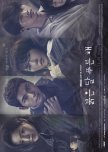
A strong production. A bold story that comes across without make-up by Korean standards
If you're looking for a KDrama of the usual type, then you won't find it in "Children of Nobody". Here you are dealing with an impressive psychological thriller with lasting influence that comes across without make-up by Korean standards. This is about child abuse. The powerful here are not the economic giants, but the parents in their sacred halls. Not funny. The story wants to stir you up and it does. In the original, the title is actually "Red Moon, Blue Sun" and alludes to modern South Korean poetry that has been quoted several times. In connection with the crimes against children, poetry seems downright paradoxical.If "Children of Nobody" at the time didn't make spectacular waves in the ratings, it's not because it wasn't done convincingly, but because there are a large number of unreported families in South Korea for whom physical abuse and the "stick of love" are still taken for granted. Sooner or later, these viewers would have to take a good look at their own noses. The topic is treated in a differentiated manner from a wide variety of perspectives.
----------------------------------------- SIDE NOTE: --- child abuse vs free, upright citizens ---
If people are broken mentally and physically from an early age, how are they supposed to learn to live as upright citizens? The road to free, responsible citizens still seems a long way off. 20/30 years ago in South Korea - without high technology, ubiquitous internet and social media - many people in their personal world largely only knew people for whom these practices of physical abuse were also a matter of course. The children and young people of today and the young parents of tomorrow, on the other hand, grew up in a time when they could learn a lot more about alternative living environments, value systems and educational concepts through the media. The field of consciousness is expanding. Conflicts with traditional structures arise. New perspectives are given space. In the exchange via social media, resistance and support can form, discussions are held and new values and self-images spread. Change becomes possible.
---------------------------------------------------------------
KDramas increasingly provide positive models of how things must become different in the future. In its own way, it tries to straighten things out in the context of child abuse that many take for granted.
Therfore "Children of Nobody" is a strong production. A bold story. A commitment to a future with free, responsible citizens - precisely because they are ruthlessly confronting with where society (in South Korea) actually stands.
Fantastic actors. Captivating story. Highly valuable.

In its monstrosity hardly dealt with war crime pulled off the dusty shelf in vividly stylized mode
The Netflix production “Gyeongseong Creature” turns out to be quite an idiosyncratic mix. Studio Dragon had the opportunity to experiment and make full use of an illustrious cast. Despite some clichés, "Gyeongseong Creature" is not a banal K-drama that you quickly forget.Basically it's another hero´s quest of some hero against his will, discovering unexpected sides of himself. It´s another ´mission impossible´ right into the lion's den - in this case: the military hospital of the Japanese colonial army base in the middle of the capital of the Chōsen colony in 1945. It is not the fair maiden who is to be saved, but the kidnapped, impregnated courtesan of the chief of the Japanese police. It turns out that a 'dragon' - in this case an artificially created monster - also has to be overcome along the way. The hero is flanked by a motley crew of long-standing and spontaneous companions...
Now this old wine comes in a freshly spiced-up Korean-style bottle. The personal touch of "Gyeongseong Creature" is precisely that Gyeongseong in those final months of the Pacific War, when Seoul bore that name. The historical setting as well as the historically and socially significant issues of Japanese colonial rule give the plot its selectivity and a quite serious foundation, so that "Gyeongseong Creature" does not simply offer interchangeable run-of-the-mill entertainment. Here, a painful chapter of South Korean suffering is intertwined with personal fates in the form of loosely interspersed critical events during colonial rule that is officially (by Japan) to this day preferable neglected, not to mention rehabilitated. With this Netflix production it has been nonchalantly thrown onto the World Channel to be proclaimed and acknowledged in HD.
This involves in general: the arbitrary racist violence and oppression against the Koreans as well as the systematic torture and execution of suspected resistance fighters in Sodaemun Prison; the forced military conscription and bullying of Korean soldiers within Japanese units; the forced recruitment or abduction of comfort women for (mass rape for the pleasure of) frontline soldiers... And specifically in the case of this story: the monstrous machinations of Unit 731 as part of the Imperial Japanese Army, which went down in history for its inhumane experiments on human subjects. Although these experiments actually took place mainly in Harbin in Manchuria (see side note below), they were for this KDrama also imported to Gyeongseong for a compact narrative stringency.
Against this background, "Gyeongseong Creature" tells its fictional story with artistic license. In some scenes you may get the impression that you have lost your way in a parody. Despite of such incomprehensible human menace and distress, the story presents itself at times completely unimpressed by any seriousness. There is room for humor and coolness, (which sometimes made me think of a parody of 'James Bond' or alike production). There is this reluctant hero who sometimes appears naive, sometimes quite cheeky and self-confident. He´s someone who has learned to achieve his goals, but who prefers to stay out of any trouble, wearing a stylish suit. And then, out of nowhere, he can withstand torture and injuries as if it were nothing at all. You can't really take this seriously. And yet...
In contrast, there is plenty of objective seriousness and expertise from the two foreign travelers on their detective mission. Pleasant extra: a clever, self-confident FL who is quick-witted in every respect.
In contrast, there is also the extremely dark world of medical experiments (and their artistic documentation) – underground on the military site.
In contrast, there are also the monsters, the army and the imprisoned test subjects.
And in the middle of the perfidious chase, the great feelings of humanity shine through: familial bonds and solidarity as well as wounded pride and jealousy act as driving forces, flanked by patriotic resistance and questionable scientific ambition. It's hardly surprising that Cupid also shoots his arrow in passing.
Not only do the individual characters at times feel like caricatures of themselves, Gyeongseong's production, choreographed in light and colors, also seems to come from an unreal fairytale world. While the pawnshop shimmers in all colors, the Japanese research laboratory is stylized as a dark dungeon beneath the military prison. And then there is the Moonlight Bar on the one hand and the police chief's property on the other - each of them control centers with a certain (political) impact. All of this is impressively aestheticized again and again in hand-picked scenes and settings. Sometimes you can feel like you're in the theater and then again like you're in the high-resolution digital world of a computer game.
So is the KDrama worth watching? On the one hand, "Gyeongseong Creature" takes itself very seriously with regard to its historical contemporary themes, but on the other hand, in the clichéd exaggeration of the individual characters, it apparently doesn't. This KDrama mix chosen for "Gyeongseong Creature" is, in my opinion, quite daring. However, I mean this in a benevolently positive way, in the sense of 'feeling free to experiment'. You might have to get used to it - but easily so. The (let´s say) rather 'banal' entertainment element - the Mission Impossible in view of the numerically superior Japanese military and the monster creation - is effectively intertwined with painful historical reality in a strikingly piquant and catchy manner. During the action-packed and visually stunning ride through the episodes, the KDrama subtly but consequently throws its barbs of memory at the audience.
The KDrama surely is offering cinematically solid entertainment with a star cast, but at the same time, based on the different personal backgrounds of the main and supporting characters, it demands acknowledgement of how the Japanese dealt with Koreans at that time. By stylizing the manifestation of Unit 731's monstrous experiments and research in the form of a concrete monster with superpowers, "Gyeongseong Creature" symbolically brings the unsatisfactorily dealt with war crime off the dusty history shelves in an unmistakable monstrosity.
...
Well, a second season has already been announced.
This will obviously be set in contemporary Seoul, though. We´ll see...
---------------------------------------------------------
SIDE NOTE: --- Unit 731 of the Kwantung Army of the Imperial Japanese Army ---
From 1932 onwards, Unit 731 of the Kwantung Army of the Imperial Japanese Army under the leadership of Ishii Shirō was stationed in Harbin, the largest city of the puppet state of Manchukuo in northern Manchuria. Around 3,000 mostly bacteriologists carried out experiments on living people there. The test subjects imprisoned and tortured there were predominantly Korean and Chinese civilians as well as Soviet prisoners of war. Later, including American prisoners of war, too.
Unit 731 of the Kwantung Army of the Imperial Japanese Army was disguised as the “Main Branch of the Epidemic Prevention and Water Supply Department.” In fact, Unit 731 in Harbin is responsible for the most cruel experiments on living humans. Later, field research was also carried out using the biological weapons developed in Harbin. The victims based on this research alone were mostly civilians - tens of thousands came together over the course of the war years.
I would like to ad that the main perpetrators of these war crimes by Unit 731, who had the full support of the later Japanese prime ministers and the Japanese imperial family, remained unpunished in exchange for the research results that they handed over to the USA...
PS:
There was no offshoot of Unit 731 in the fictional Onseong Hospital in Geyeongseong. That's fictional.
There was no Onseong Hospital in Gyeongseong either.
However...
---------------------------------------------------------
SIDE NOTE: --- Gyeongseong Japanese Military Hospital ---
The main KDrama setting is a colorful look and feel of Gyeongsong (Seoul at that time). The focus is on the architecture of the Republic's former Defense Security Command Center. On the area between the palace and the old town of Bukcho a military hospital was built by the Japanese in 1928. The Onseong named Hospital in "Gyeongseong Creature" is fictional, but the architecture that takes center stage is in fact related to a real Japanese military hospital before later actually becoming part of the Republic's Defense Security Command Center.
Until about two decades ago, this area was an urban area closed to the public and with bad memories for the people - not only of the activities of the colonial rulers, but also of their own military, which staged a coup against the people here in the 1970s. Furthermore, many South Koreans were tortured and mistreated there (by the security officers of South Korea's dictatorial regime). Until recently, human rights was an unknown concept behind those walls.
The ensemble could have been demolished, but the people decided to preserve the building as a memorial. The historical witness is now part of the National Museum of Modern and Contemporary Art. The bloody past is thus being countered with something positive: the imagination and emotional power of modern art.
Here, with the KDrama "Gyeongsong Creature", the dark past of this military area bearing a bloody and painful past, which began with Japanese colonial rule and was later continued by South Korean government officials, comes to life again with artistic license, too - as representative contemporary witness in HD.
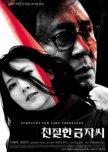
It´s Girl Power time! Outrageous, luminous angelic + consistently deadly, too. Pitch-black humour.
"Sympathy for Lady Vengeance" or in the original "Lovely Geum-ja" is grossly funny, bitterly satirical, with a huge portion of pitch-black, bone-dry, unpredictable humor. The KMovie playfully juggles with details that seem to have sprung from a film noir and, above all, deliberately wants to irritate with the aestheticizing stylization of bloodthirsty revenge.Geum-ja is an Angel of revenge in the most literal sense. Luminous, angelic in her kindness, yet consistently deadly when it comes to her revenge mission. This makes the KMovie a paradoxical, incomparable experience: bizarre, absurd, dark and yet pointedly funny.
It´s is Girl power time! Patriarchy is in the pillory, regarding various offenses and arrogance of most of the male characters. Geum-ja (convincing to the point: Lee Young-ae) offers the entire program of associations with the feminine in its blatant contradictions: saint, whore, witch, as well as mother, lover, friend. Guilty in naive innocence. Outrageous. Diabolical. Sovereign. Powerful. Decided. Efficient. Exhilarated. Significantly, a remix of Vivaldi's "Ah ch'infelice semper" swings the baton in the background.
Storytelling is always close to Geum-ja. Not too much, just as much as is needed, is given to the audience. A serious, deeply meaningful off-screen narrator closes the gaps. As I said, the humor is pitch-black.
By the way, the KMovie (which has also received many international awards) is the third part of a revenge trilogy by director Park Chan-wook, which includes "Oldboy", that is considered one of the most influential films of contemporary South Korean cinema.
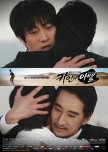
This is the first time I would actually describe a KDrama rich in makjang in terms of ´cool´.
"Cain and Abel" from 2009 presents itself in the best KDrama tradition of early 3rd Millenium makjang productions. In the background, the OST is repeatedly setting the rhythm proclaiming doom with implacable beats. The dramaturgical motifs are basically familiar: there are 2 more or less competing brothers, a wicked stepmother, a comatose father, amnesia in the meantime, two queens of the heart ... and what the hospital environment (specifically the neurosurgical department) has to offer is not just a brain tumor... It´s makjang at its finest. Eventually the scene is temporarily shifting to China, there also focusing on the unfortunate issue of North Korean refugees. It becomes action-packed and exciting. All in all, the plot doesn't seem too surprising at first glance, but as it progresses you might all of a sudden realize, how the story has long since grabbed and pulled you in.This is the first time I would actually describe a KDrama rich with makjang in terms of ´cool´.
Admittedly, here the bad guys are actually truely bad guys. Forgiveness is not a foreign word, but sometimes one may want to question this concept in principle, regarding the unscrupulousness and maliciousness of the perpetrators.
Title and story explicitly refer to the biblical motif: the first murderer case in human history told in Christian terms, where the older brother chose his younger brother as a victim. Out of envy. In the competition for recognition. Here it is the recognition as a brilliant neurosurgeon ... by the father, by the professional world, by the supervisory board (as head of a new center for neurosurgery) and as a man (by his queen of hearts). The mother wickedly helps and sows the bad seed, which grows effortlessly.
This fraternal quarrel (in which obviously not everything is and always has been quarrel) comes to live with high intensity by the performance of So Ji-sub (who appears in a quite bold manner for long stretches) and Shin Hyun-joon (who has already perfected his characteristic ´sad look´ in "Stairway to Heaven"). The two really get into their roles and take the viewers with them. The story gains as 'little Abel' covers a good distance in a parka and among refugees in China. So the story not only takes place in the elitist world of doctors, between surgical gowns and suits, but also gets more down-to-earthness in the struggle for survival of simple and non-privileged people at the opposite pole of social life. The two female leads Han Ji-min and Chae Jung-an also embody the contrast of these worlds in their own way.
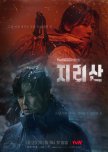
"Jirisan" radiates within the slowed down, yet powerful dynamic of the mountain world
"Jirisan" pays tribute to South Korea's first and largest national park and its rangers, who ensure security and order here. The KDrama weaves an exciting story that also takes into account the special aura of the mountains, adding a good portion of mysticism. Actually Jiri Mountain is quite legendary and downright sacred for Korea. It's worth watching the KDrama for that alone.Other quality guarantees are given by the handpicked cast and high-end production.
A joy for some, a curse for others: "Jirisan" radiates within the slowed down, yet powerful dynamic of the mountain world. The story itself is a bit reminiscent of a mountain hiking tour: it's not a stroll. You need the right footwear. Sometimes you might think you've lost your way. The story is told in several timelines. Yet it chooses its own rhythm with a sure step, that leads to the final destination. On the way it is continuously enriched with worthwhile vistas along the entire route... Fast pace and airy love story are not part of the baggage. But exciting entanglement over time, unconditional trust as a topic in the team of rangers, as well as love in its essential form and various expressions (... e.g. for the mountain).
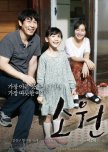
Even though what happened is unfathomable, despite all the tragedy, the deeper focus is on hope
A true story. Not the only one of this kind, unfortunately. This one took place in South Korea in 2008 and was filmed in the KMovie "Hope" in 2013. (In the original: "Wish" - the meaning of "Sowon", the name of the eight-year-old protagonist.)This film production, which was shown in neighboring Asian cinemas, too, achieved great success largely through word of mouth. The story is shocking and touching, while the film adaptation laid its focus less on exploiting the crime itself, than on sensitively dealing with how it affected the little girl, her family, friends of family and classmates. It's less about the incredibly unscrupulous, brutal act than about the family's struggle to continue to come to terms with the unfathomable and the consequences on a wide variety of levels - psychological, physical, social, financial, legal, media-related and everyday practical.
“Hope” received quite some film awards. Despite all the heartbreaking tragedy, the KMovie deliberately intents to touch people in a positive sense. The KMovie wants to open up an, nevertheless, optimistic perspective towards a life 'after'. This, obviously, is tough and challenging. Surely it takes time and even more patience. Heart-rending in this context, for example, is the wonderfully authentic portrayal of the massively threatened father-daughter relationship. Unexpectedly, though, some light comes into the darkness. Sol Kyung-gu - in the role of a desperate father, whose daughter is in danger of slipping away from him due to her terrible experiences – apparently did not take off his distinctive costume throughout the entire shoot in order to maintain high contact with the emotions and their intensity the whole time. And Lee Re, in her debut on the big screen as an eight-year-old daughter, also touches the heart, as does Uhm Ji-won, who initially apparently didn't have the courage to take on her role of the mother. She is also deeply touching with her convincing acting that gets right under your skin.
Even though, what happened is and remains unfathomable, despite all the tragedy, the KMovie explicitly focuses on hope. This way, throughout those 122 stirring minutes it is not all grim all the time.
------------------------------------------------------------------------------
SIDE NOTE: --- The Cho Doo-soon case ---
The story refers to a rape case from 2008, when a drunken 57-year-old man brutally raped an eight-year-old girl in a public toilet in Ansan. Being as brutal as he was, the girl suffered permanent damage. However, the man (who before had already been convicted of rape, among other things) got away with only 12 years in prison. He consequently kept up his mantra, that being so drunk that day he couldn´t remember anything. This had already helped him in previous cases. Here too, he was given mitigating circumstances due to his age, the influence of alcohol and his mental state.
The rape in Asan was extremely gruesome. (The details were not in so much details explicit in the KMovie and I also do not want to waste any letter for them here, either.) Suffering from her internal and external injuries, the girl was hospitalized for eight months. She took an artificial anus back home. Medical treatment was followed by psychiatric treatment. A year later she was at least stabilized enough to go back to school. But even several years later in 2020, she apparently can handle harmless cartoons on TV only, avoids any news and tough topics, i.e. she is still extremely fragile and unstable when it comes to the issues involving any violence at all.
The investigation and trial in this case from 2008 didn´t get covered in glory. On the contrary. The public outcry was great and extended, among other things, to a petition to the Blue House for retrial. The case also led to a number of legislative proposals being submitted by the Democrats, which would, for example, suggest to imprison repeat offenders of sexual offenses against minors in special facilities for life, or e.g. concern the legal handling of sexual offenses committed under the influence of alcohol. But in the end they didn't go through, nor did various petitions.
Instead, the electronic ankle bracelet was the method of choice when Cho Doo-soon was released in 2020. The cost of continuous monitoring of Cho Do-soon's electronic ankle bracelet during the first 4 months after release only, was estimated by the Ministry of Justice at over 200 million won (over 140,000 euros). In addition, apparently 71 security cameras were set up specifically to protect Ansan's residents from Cho, who still has his wife and his home there…
By the way, the infamous Cho Doo-soon case was also topic in the K-dramas "Taxi Driver 2", "Voice 4" and "Vigilante".

Us walking along in those indifferent (?) shoes of Han Gong-ju is the great power of this KMovie
Among independent South Korean film productions, “Han Gong-ju” is considered one of the most successful to date. In fact, the number of viewers exploded within the first week - through word of mouth alone. In addition to this vote with feet, there were consistently positive (national and international) film reviews and awards."Han Gong-ju" offers relentlessly haunting independent KMovie quality, frugal, not easy to digest, yet calmly, subtly and sensitively told, too. Behind the seemingly indifferent attitude of the protagonist, highly concentrated emotional force blazes subliminally, which is released less in the protagonist herself than within the audience. By the way, the story is based on a true story. (More background below - but that's quite a spoiler... so if you want to watch the film, you might want to read it afterwards!)
The KMovie tells the story of the fictional Hang Gong-ju in a rather reserved manner. We initially follow the girl without knowing what it is about or what she actually has experienced. Over time we learn to understand, or better: vaguely guess what she was and is going through. Over 112 minutes we see and experience the world vaguely through her eyes. This is a great power of this KMovie. The girl´s everyday world is fundamentally threatening, unwelcoming and cold, almost merciless. Han Gong-ju herself is tough and clear, demure and mostly indifferent. (Hang Gong-ju may by now have learned to face her world with indifference, but we as audience? We may feel differently here and there…) Nevertheless, she also has learned to create islands in her life that offer at least some minimalist beauty, joy and perspective.
What happened and is happening to Hang-Gong-ju admits of no excuse. But unfortunately it happens everywhere. Not just in South Korea. Unfortunately, again and again, more and more often. *
The role of adults is also inexcusable. It is we so-called 'adults' who lay, or should lay, the foundation for a sense of justice in the upbringing of our children. However, in this story (and its true background) it failed spectacularly. On several fronts. The results can be considered rather grim.
As solid and reliable role models that 'we' adults are/should be: how do we actually relate to right and wrong? Parents who would rather protect their beloved children from the consequence of their (any) actions, than confront them with it – yes, that's understandable. But will the 'children' learn from their mistakes in the future (without any true feeling of guilt about having done something wrong)? So that they might not replay their misbehaviour in the future? Rather not. However, if everyone prefers to proclaim an exception rule for themselves (and their loved ones), that cannot work out well. So it always ends in fighting and stabbing... by any means.
The irony: For cinema and television this is actually quite wonderful, because thus there are always new, stirring stories to tell. In the case of "Han Gong-ju", fortunately the entertainment gain does not come from dramatically exaggerated voyeurism, but rather from the fact that we walk a part of the truly sobering track in those indifferent (?) shoes of Han Gong-ju. By doing so, clues putting the (difficult to digest) puzzle together accumulate...
Lee Su-jin's KMovie is consistently serious, unpretentious and at the same time convincingly authentic in the presentation of the protagonist. Chun Woo-hee in her difficult role as Han Gong-ju is also outstanding and masterly in this context!
-------------------------------------------------- -------------------------------------
SIDE NOTE: --- Events at Miryang Middle School in 2004 ---
Over a period of just under a year, at least 44 (but possibly more than 120) high school students repeatedly raped three 13 to 17 year old girls and filmed them in order to blackmail the victims. The gang rapes obviously happened as a purely entertaining pastime for the boys.
The first 14-year-old victim was blackmailed with the film recording to bring her younger sister and her older cousin to the subsequent 'meetings', who then also became victims of renewed gang rape. In addition, the victims were forced to pay so that the footage would not be published. There may have been even more victims.
As unforgivable as these actions are, dealing with them was even more unforgivable. After the girls' aunt reported the case, of 44 clearly identified repeat offenders, only three were initially actually arrested. Due to massive public pressure, 9 more were taken into custody and a further 29 were officially arrested but not taken into custody.
There were no serious consequences for the perpetrators. On the contrary, the victims became victims again! On the one hand, they suffered psychological damage during the interrogation due to insensitive, confrontational confrontations and verbally abusive male officers (even though the victims had expressly asked for female officers). On the other hand, parents tried to force the actual role of perpetrator on the victims due to provocative behavior.
Finally, the defenders pointed out that some of the boys are already about to enlist in respectable universities and would soon contribute to the shining future of the city. In general, the parents of the perpetrators managed to build up pressure in various directions and also helped with money to box their boys out of the annoying situation. Among the victims' parents, on the other hand, one father unforgivably exploited his daughter's predicament for his own benefit. Ultimately, only 5 boys were tried in juvenile court. Without serious consequences. They are now probably fathers themselves and are firmly established in their careers.
In the meantime, this and that may have changed legally (and also when it comes to investigating), in South Korea and Germany and in other countries, too. But still, in current cases of juvenile sexual offenses, to date a strong tendency among parents here and there is increasing to wanting to box out their loved ones by all means possible, regardless of the losses. Far too rarely is attention paid to reflecting to their sons (and/or daughters) when they in fact tremendously misbehaved, that, yes, they are still loved and ok, BUT THEIR ACTING IS NOT OK at all. As a matter of course they will have to face the consequences – as serious misconduct that the social community we live in does not tolerate.
… However, our problem is: 'we' obviously DO tolerate it... Over and over again.
Sadly, in this respect, the KMovie “Han Gong-ju” is as topical as it was in 2013.
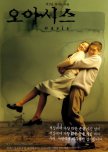
Thought provoking. Confronting the arrogance of the ´normal´. Truly outstanding acting performance
"Oasis" was highly celebrated by international film critics in 2002. Director and screenwriter Lee Chang-dong, who had with "Peppermint Candy" in 1999 already contributed a milestone in Korean film art, came up with this unusual love story between a mentally retarded young man and a young woman with infantile cerebral palsy. In doing so, he once again relied on Sol Kyung-gu and Moon So-ri, who had proven themselves as a couple in "Peppermint Candy" and who now once again deliver truly outstanding acting performances in "Oasis". The list of international awards – i.e. in Venice, Vancouver, Bergen, Brisbane, Seattle and Seville - as well as in South Korea, is long. And rightly so.“Oasis” is pure (independent) KMovie! It impressively embodies a great strength of South Korean movie production: ruthlessness! Even if social life is characterized by facades, coats, make-up and social reputations, modern South Korean cinema has (since the end of dictatorial censorship) proven what 'independence' really means. The freedom to finally show things the way they really are! Not being afraid of what is hurting, what is ugly, what is disgusting! The brutal revelation of the emotional abyss to which the human soul may be exposed over the course of a human life. Situations and moments in life that people tend/wish to quickly forget. The cruelties that people are capable of inflicting on each other. The look behind the facades and underneath the coats, where we are naked and without make-up, alone and vulnerable. But this is where we are sincere and real, too. From there, a new form of beauty and strength can grow. KMovies bring to light even the unloved, unpleasant, repressed, despised, perverted, uninhibited, disturbing human emotions with magnificent intensity, which are often presented so authentically that it hurts (because it's so true). The protagonists have no claim whatsoever to be likeable. This creative courage, when it comes to production and performance, as well as the audience´s willingness to open up to these cinematic works is (in my opinion) almost unique.
“Oasis” offers an impressive expression of this particular artistic attitude. This is a thought provoking KMovie confronting the arrogance of the ´normal´. The plot is about a young woman and a young man who – in the eyes of their social environment - preferably should be socially isolated and actually locked away, as they are supposedly unpresentable. Because of their disability, they are ultimately just a nuisance, causing work and trouble, irritating the 'normal' people with their unpredictable behavior, and actually not contributing anything... Because the families are ashamed of them.
The KMovie bluntly frames that social norms are in fact more important to 'us' than people. "Oasis" encourages to open up a bit and approach the lives of those 'waywards'. And lo and behold! They are sensitive, soulful people like 'us' - with feelings, dreams and longings. They are falling in love. They long for relationships. They are just people, too. Lovable people. Adults with their own lives.
'He' is a physically healthy man in his late 20s, but at the mental level of an 8 year old. He is strong, but easy to manipulate and rather simple-minded. 'She', on the other hand, is physically handicapped due to her severe infantile cerebral palsy to such an extent that she is dependent on help. Due to the impairment of her nervous system, which affects voluntary motor skills, speech disorders, spasms, as well as sensory and motor limitations are occurring, too. Intelligence isn't actually her problem, but that young woman in "Oasis" apparently wasn't given any specific assistance, just basic care. She has her difficulties communicating.
The way the families treat their ´waywards´ is horrendous. In fact, they are both unscrupulously exploited and abused. And both are helpless in their own ways. He doesn't fully grasp the situation. She is physically dependent on helping hands.
The romantic relationship between the two is quite something else. Their start can be considered downright dubious. And yet, as the odd couple they are, they both are happy together. The picture of the oasis on the wall jumps out of its frame and fills the room. In their togetherness, the couple has created an almost magic space where their souls can relate and recharge, where they can be a different person. It is touching, indeed. ´He´ is a responsible man and she is a desirable woman! Yet, this reality is completely alien to their social environment. The families don't have the slightest idea, that this could be even possible: those two ´handicapped losers´ being actually able to genuinely caring for each other and loving each other just the way they are. Not even their closest families honestly tried to truly reach out and attempt to understand their brother/sister.
Bringing the quality of this relationship against all odds authentically to the audience is the unique beauty and strength of “Oasis”. Although 'beauty' is not otherwise something, one would directly associate with this movie. There is hardly any beauty in the world of those two protagonists, where their environment isn´t taking them serious at all. They are either patronized or treated in a disrespectful and disdainful manner. Nevertheless, their feelings for each other radiate beauty and grace. Interaction may inevitably be rather awkward, but still they find their unique way. In the end, it all comes to an almost passionately brilliant finale when HE risks everything in order to by all means keep his promise to HER: sawing off the branches of the tree in front of her window, which only cast shadows on her beloved oasis picture on the wall...
The KMovie leaves us with our thoughts behind. Touched. And - substitutional for those two families, the police, the neighbors etc., who in their arrogance are blind to the inner world of those two lovers – ashamed, too.
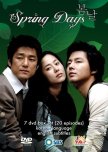
There are times, I think, when nothing beats a KDrama from the early 2000s
"Spring Day" is a love story told in a triangle. So drama in drama feels right at home here. And "Spring Day" has a lot more to offer in the proven makjang-mix to really heat up the story. If the merry-go-round isn't going straight forward, than simply because it's going backwards.Three is one too many. Being well aware of the consequences and where the story must lead towards, it is nevertheless the path that paves the series pleasure of cathartic ups and downs. You can get really upset about this and that. The rhythms of the soundtrack whip your emotions through the most varied of situations. The assorted mix of (by now long) proven actors give the protagonists their three dimensional profile. None of those characters is really grippy, smooth or edgeless, though. Whether brotherly relationship, romance or parental relationship, it´s all full of sometimes touching, sometimes pathetic ambivalences – sometimes hurting, sometimes soothing and hurting at the same time. In short, the KDrama presents quite some space for compassion and catharsis.
There are times, I think, when nothing beats a KDrama from the early 2000s. I couldn't have timed my ´Spring Day´ better (in Spring 2023). After a flood of stories about contemporary scheming, autocratic backroom politics, bullying among students and misogyny, "Spring Day" feels like an island in many ways. The world is not safe there, on the contrary. Makjang rocks the turbulence upwards. Nevertheless, there are 'only' personal destinies and family tragedies here that do not have the social impact of some current series topics. We get thrown around in an ambivalent emotional swell between 'soothing' and 'hurting'. In the end the story is told to the end. The ending may or may not please, but it has its ending. (A lot of recent KDrama with current underlying social issues tend to deep down leave a thorn after the end of the story, as the social swamp that fueled the story remains a given reality and lingers on…)
------------------------------------------------------------------------
By the way:
With "Spring Day" in 2005, Go Hyun-jung marks her comeback after a War-of-Roses divorce with a Jaebeol of the Samsung Dynasty. So in 2003 she actually had just finished her own Makjang drama personally. Eventually, she was able to free herself from the obviously tormenting clutches of her husband and his dominant, oppressive family, who (so it is said) permanently devalued her because of her humble origins, simply making use of her beauty for bearing pretty children. Yet the price for liberation was high. Above all, she had to leave her children behind and give up visitation and custody rights. Although she was able to re-establish her life somehow against all (by her husband´s family deliberately implemented) odds , she (so it is said) still is not allowed to see her children to this day.
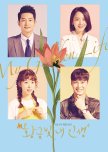
Weekend family drama, progressively challenging the concept of becoming/living as an ´adult´
“My Golden Life” is one of those KDramas that have been writing drama-history in South Korea. It is considered a 'national' series – popularity increased rapidly, the number of viewers doubled during the broadcast and towards the end, almost half of all nationwide TV audience during the weekends, while “My Golden Life” was broadcast, watched this series."My Golden Life" is a family drama, that doesn't just get lost in family clichés, Makjang and RomCom, but instead explicitly addresses some critical contemporary issues. Additionally, given attitudes and convictions are boldly deconstructed along the way. Thus, "My Golden Life" is a rather progressive family drama, involving also the 'quite new' concept of making personal life decisions despite (and in opposition to) family interests. In addition, more than one protagonist is questioning his/her life decisions or is forced to dealing with 'failure' (up to 'depression' as a result of learned helplessness), which is also quite progressive. Whether rich or poor, such issues likewise hit any income classes - in “My Golden Life”, too. In addition, there are current long-running topics such as the (lack of) work-life balance, discrimination because of social status, and the shame of divorce, as well as the increasingly sensitive issue of 'age'.
Ultimately “My Golden Life” is progressively challenging the concept of maturing in the sense of making my own, accountable decisions and thus becoming/living as an ´adult´. What does it mean, what does it need to be an 'adult'? ´Adult´ in the sense of having grown out of the familiar nest and being able to fly with my own wings? In the sense of being challenged to apply what I have learned in my own, individual manner? Is it allowed? Actually desired? Even wanted?
Notably gratifying and astonishing: Throughout the series, practically all of the divers family members go through their personal maturing processes against the background of various contemporary social issues. Many dramaturgical motifs may be familiar, but you can be sure that sooner or later everyone will be challenged with their attitudes and decisions being on trial. “My Golden Life” is not about stumbling through life with a social reptilian brain in obvious stimulus-response pattern. And it is not about by all means controlling the environment with the arrogant mindset of absolutist power fantasies. "My Golden Life" is intelligently and systematically deconstructing the usual set screws for critical life decisions (and dramaturgical plot developments.) In the end, almost every protagonist gets challenged and in the long run actually they all come to their individual, sometimes astonishingly mature, honest and even wise reassessments and re-decisions. This is (at least in this KDrama) possible, permitted, actually prerequisite.
Strikingly symbolic to deconstruction processes of social and individual assumptions throughout the story, ´gold´ is a metaphor for the estimation and valuation of an individual life. Its meaning and value is changing throughout the KDrama, parallel to the transformation processes of the protagonists... Most of the characters initially have the conviction that money (and associated with it: status) is the prerequisite or guarantee for happiness and a worthwhile, precious life... (as on the other hand the lack or loss of money is the reason or the cause of unhappiness and equivalent to a nugatory life.) However, most of them realize over the course of story that a ´golden´ life is not necessarily one that is successful, prosperous and meaningful because of a lot of money. In fact, an elitist, privileged life - being born with a ´golden spoon´ in the mouth - eventually comes with a ´golden cage´, too... Rather, a ´golden´ life is cordial, substantial and radiant with accountability and authenticity.
Within turbulent relationship dynamics (including a bit of Makjang-style topping when it comes to plot development) the 'impoverished middle class' and the 'dirty rich Jaebeol clan' are cleverly juxtaposed against each other, thus almost offensively confronting with the exaggeration of social class-affiliation and questioning traditional mindsets; additionally, full of wit contrasting submissive obedience and self-confident rebellion. Meanwhile, a dubious, arrogantly patronizing 'Noblesse oblige' virtue is craftily criticized, too.
“My Golden Life” is sometimes funny, sometimes intelligent, sometimes outrageously provocative, sometimes infuriating, sometimes emotionally serious, sometimes touching and sometimes downright grotesque. Being set as a family weekend drama, it is supposed to be easy to digest… yet, at the same time, the KDrama is consistently keeping its unabashed finger (gently, yet persistently) on the social scrapes, quirks and deep wounds, too. An astonishingly felicitous, ambitious balancing act. Overall, “My Golden Life” isn´t long-winded, even with 52 episodes. You may as well give it a try.
P.S.:
'Reassessment' seems to be the greater moral of the story.
Meaning: Traditional structures, rules, proven patterns and given orders may be all well and good. They may give orientation and set a direction in life. They provide a certain range of tools and know-how on how you can meet the challenges of life. But ultimately, in each individual case, it is still indispensable to carefully consider the appropriate application and decide for yourself what actually should be and could be accomplished. What is it, that I want? What is it, that I can do? What is it that I think is right? And what is it, that I am willing to supply?
At the end of education and apprenticeship usually there is a form of diploma or master's degree – not for mere copying, but for suitable, at best innovative application and enhancements. And in "My Golden Life" there are quite a few characters truly having earned their award... each in their own way. Eventually, it won´t do to simply adopt what others suggest, would have done or did before. It is all about individual solutions. Traditional lifestyles and attitudes are put to the test and are systematically deconstructed - voluntarily or involuntarily. In the end, the individually appropriate reassessment and authentically fitting solution does not necessarily have to lead to an easy or obvious decision...
"My Golden Life" is thus also giving a lesson in emancipation, too - in the original Latin and also in the more modern sense. Initially, Latin “emancipatio” was the “release of the son from paternal power”. In a broader sense: the child has grown or the student has been educated, so they can hold themselves accountable for their own life tasks and work obligations and thus take responsibility and reflect on their achievements accordingly. Additionally, in a modern, more general sense, emancipation is freedom from discrimination based on group, sex or class membership…


 9
9 37
37 15
15


















